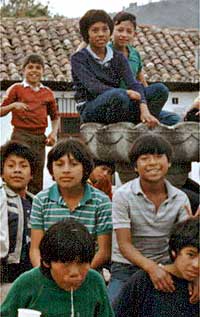
Pictures of U.S. Marine Lance Cpl. Jose Gutierrez at the home of his sister Engrecia Sirin Gutierrez, 32, in Guatemala City
In 1997, the U.S. Immigration and Naturalization Service picked up a baby-faced young man. Gutirrez claimed he was only 16 and eligible for asylum. The usually unbending INS believed him and let him stay. It had been a lie, but it was hardly the most extreme thing Gutierrez had done in his life. He had been born in Guatemala in 1974 but his parents died while he was very young during the countrys brutal civil war. His sister Engracia, just four years his senior, was his only remaining family and he lived on the streets of the capital, Guatemala City. In 1982, at the age of eight, social workers took him to live at a home for orphaned boys, Casa Alianza, the Latin American arm of the New York-based Covenant House. He spent more than 10 years there, receiving good grades studying technical drawing. Says Casa Alianza executive director Bruce Harris: The kids who have lived on the street and have survived are real go getters.

COURTESY OF CAZA ALIANZA
Jose as a young orphan (2nd row in the green-striped shirt) living at Caza Alianza in Antigua, Guatemala, taken when he was about 10 |
After a fight with a teacher at Casa Alianza when he was 16, he ran away, spending another 18 months on the streets where, says Harris, he would get high sniffing glue to try and forget how hungry and lonely he was. He found work as a baker and then as a sewing machine operator in a sweat shop. He even managed to keep up his studies. It was partly the love of Engracia that kept him going. In 1996, he set off on a 2,000 mile journey north, through Mexico on foot and by hitchhking rides and catching freight trains until he reached California. He promised Engracia that he would find a way to bring her up north to join him one day. Says Lillian Cardenas, who would become his foster sister in the United States: He had nothing, no money, just the will for a better life.
After winning asylum, Gutirrez shuffled between foster homes and was eventually placed with Marcelo and Nora Mosquera, themselves immigrants from Latin America. The Mosqueras, who have three biological children of their own, have raised 30 foster children. And so the Guatemalan orphan who had barely a family suddenly had a tribe of foster siblings. Still, he never forgot Engracia and the hardships she continued to live with in Guatemala. He would send her $20 or $30 whenever he could. Gutirrez went to high school and community college, and dreamed of being an architect. But, on the advice of a foster brother, he joined the military. There was a reward he hoped to claim by joining the armed services: citizenship. And once he was an American, hed be able to bring his sister over. He became a Marine less than a year before he died, joining the infantry as a rifleman in the First Marine Division, based at Camp Pendleton, California.
He embarked for Kuwait on board the U.S.S. Rushmore in early January. The last time he wrote to his foster mother he complained he couldnt keep the sand out of his tent or food. Less than a month later he was dead.
The day after he was killed, a chaplain and several military men arrived at the home of his foster parents in Lomita, just south of Los Angeles. My mom had heard on the news that day that two Marines had gone down that day, says Cardenas, And so she asked if one of them was her son, and they said yes.
On that same day, at 2 a.m., officials from the U.S. Embassy in Guatemala arrived at the home of his birth sister, Engracia, now 32. It was difficult to believe, she told the Associated Press, I thought it was a mistake. Gutirrezs body now lies at Dover Air Force Base, Delaware, while arrangements are made to return him to Guatemala. His foster parents will travel there for the funeral and his sister is planning to come to California next week for a memorial service.
In honor of his military service and death in combat, federal authorities have made him eligible for posthumous citizenship. All that needs to be done is for his next of kin to take his death certificate and $80 to an immigration office and Gutirrez will become an American. Had Gutirrez lived, his dream for his sister could have come true. She would have qualified to immigrate to the U.S. had he been naturalized. But that dream died with Jos Gutirrez in Iraq.
